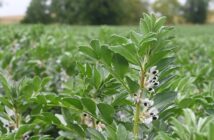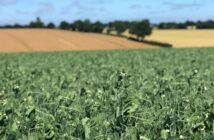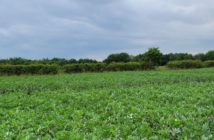Mole Valley Farmers are running a new ‘field lab’ through the Innovative Farmers network to test the viability of growing combinable organic proteins, in particular Lupins, for animal feed.
With the current difficulties in maintaining a regular supply of imported organic protein for animal feed manufacture, Lupins may offer a solution, providing a valuable cash crop and also improving soil fertility. Lupins offer a good protein level as a combinable crop and can be used in feed mills without additional processing.
Nigel Mapstone of Mole Valley Farmers is co-ordinating the field lab. He said; “Lupins are high in protein and good to grow in our temperate climate. This can help to reduce feed miles and, perhaps more importantly, offer greater self-sufficiency and food security for the UK.”
There are many benefits with this protein crop. They’re great for pollinators, plus Lupins are nitrogen fixing legumes so can be included in an arable rotation to reduce the need for fertiliser and improve crop yields. Modern varieties of blue and white Lupin give better yields and mature earlier than previous commercial varieties, although consideration will still need to be given to soil type.
Nigel continued; “At Mole Valley Farmers we identified possible further concern with the supply of organic animal feed, but also a rise in demand from the USA. The UK has a great climate for growing these kinds of crops and we are hoping that the more tolerant Lupin, which also requires less processing, could offer British farmers an answer. At present due to unreliable yields there are very little combinable organic proteins grown in the UK.
“Some of the farms involved in the trial have a higher soil pH and so may look at growing soya instead of Lupin. Soya may do better on chalk down-land where some of the group farm.”
Both crops require an inoculant containing symbiotic bacteria to be drilled with the seed, but Lupins can be drilled with a standard cereal drill.
The main issue the group will be looking at is the best way of supressing weeds. Likely options are comb harrowing, bi-cropping with oats or peas, or under sowing with a white clover/ryegrass ley.
The researcher supporting the group will be Hannah Jones from the University of Reading, who has been involved in a number of research projects on growing organic legumes. Further meetings are planned with the aim of drilling some trials in the spring.




